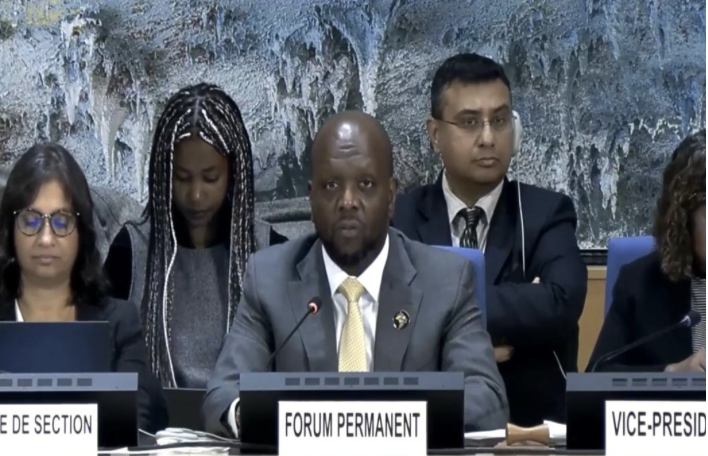
Advancing Recognition, Justice, and Development for People of African Descent in the Age of Artificial Intelligence
The 60th Session of the Human Rights Council
8 September to 8 October 2025
Item 9: Interactive Dialogue on the report of the Permanent Forum on People of African Descent
1 October 2025
By Jamel Nampijja / GICJ
Executive Summary
During the 35th and 36th meetings of the Human Rights Council's 60th session on 1 October 2025, Mr Martin Kimani, Chair of the Permanent Forum on People of African Descent, presented the Report of the Permanent Forum on People of African Descent (A/HRC/60/72), which discussed the outcomes of the Forum's fourth session.
The fourth session was held in New York from 14 to 17 April 2025 under the theme "Africa and people of African descent: united for reparatory justice in the age of artificial intelligence," in accordance with General Assembly resolution 75/314. This report fulfils the Forum's mandate to examine the challenges faced by people of African descent and to propose strategies to advance their recognition, justice, and development. The report included a summary of the Forum's discussions, conclusions, and recommendations from the fourth session.
The report emphasised the urgent need for reparatory justice, which should be comprehensive and multidimensional. Key measures highlighted include recognition, restitution, compensation, cultural and heritage restoration, climate action, debt relief, and guarantees of non-repetition. Delegations and civil society stressed the importance of meaningful participation from affected communities, particularly youth and women, and stressed the need to tailor reparatory measures to local and regional contexts.
During the Interactive Dialogue, Member States, civil society and human rights organisations generally supported the report's findings and recommendations. Delegations shared domestic initiatives, such as legal recognition of African-descended populations, restitution of lands and cultural heritage, affirmative action programmes, and institutional reforms to dismantle structural inequalities. Many emphasised the importance of regional cooperation, high-level advocacy, and integrating reparatory justice into international human rights frameworks.
A key topic of discussion was digital justice and artificial intelligence. Delegations emphasised the need for ethical AI governance, safeguards against bias, equitable access to technology, and inclusive STEM education. It was noted that coordination between UN bodies and the active participation of developing countries and marginalised communities are essential to ensure technology empowers rather than marginalises.
Regional consultations in Colombia and Brazil were highlighted as effective examples of engaging with African-descended communities, fostering dialogue on reparatory justice and contributing to the drafting of the UN Declaration on the Rights of People of African Descent.
Civil society organisations also emphasised that reparatory justice is a binding obligation that requires transparent, participatory, and evidence-based implementation. They called for system-wide UN action to integrate anti-racism and reparatory justice into economic, fiscal, and policy frameworks. In his final remarks, Mr Kimani outlined measures to combat racism in AI, including nominating experts, submitting evidence of harm, and linking intergovernmental dialogue to national legislation and human rights processes. He also reiterated the importance of regional consultations to promote inclusion and engagement with African-descended communities.
The interactive dialogue concluded with a shared understanding that achieving recognition, justice, and development for people of African descent is urgent and complex. Delegations and civil society reaffirmed that reparatory justice, inclusion, and accountability are essential for creating equitable, inclusive, and sustainable societies worldwide. They emphasised that priorities must be integrated into the Second International Decade for People of African Descent in a strategic, action-oriented, and well-resourced manner.
Geneva International Centre for Justice (GICJ) welcomes the report of the Permanent Forum on People of African Descent regarding its fourth session. We urge the United Nations and its Member States to take advantage of the Second International Decade for People of African Descent to implement concrete measures for recognition, reparatory justice, and inclusive development. We call for the adoption of the UN Declaration on the Rights of People of African Descent and for the integration of its principles into national and international policies. Acknowledgement of historical and structural racism must lead to tangible justice and lasting equality for all people of African descent.
Background
The concept of the Permanent Forum on People of African Descent originated from General Assembly Resolution 69/16 adopted on 18 November 2014. This resolution called for the establishment of a body to support people of African descent in line with the objectives of the International Decade for People of African Descent (2015–2024). The Forum's creation reflects a global commitment to combating racism, racial discrimination, xenophobia, and related forms of intolerance.
The Permanent Forum was formally established by General Assembly Resolution 75/314 on 2 August 2021 as a consultative mechanism and advisory body to the Human Rights Council. It held its inaugural session from 5 to 8 December 2022 in Geneva. It serves as a platform for people of African descent and other relevant stakeholders to improve their safety, quality of life, and livelihoods. Additionally, it provides expert advice to the Human Rights Council, General Assembly committees, and other UN bodies on issues affecting people of African descent.
The Forum's mandate encompasses a broad range of responsibilities aimed at advancing the rights, inclusion, and recognition of people of African descent worldwide. Its core functions include:
- Contributing to the full political, economic, and social inclusion of people of African descent as equal citizens, ensuring that they enjoy all human rights without discrimination.
- Providing expert advice and recommendations to the Human Rights Council, General Assembly Main Committees, and other UN organs, agencies, funds, and programmes on challenges related to racism, racial discrimination, xenophobia, and related intolerance.
- Contributing to the development of a United Nations declaration on the promotion, protection, and full respect of the human rights of people of African descent.
- Identifying and analysing best practices, challenges, and opportunities to address issues highlighted in the Durban Declaration and Programme of Action relevant to people of African descent.
- Monitoring and reviewing progress on the implementation of the International Decade for People of African Descent, gathering information from governments, UN bodies, intergovernmental organisations, NGOs, and other sources.
- Promoting knowledge and respect for the heritage, culture, and contributions of people of African descent, as well as raising awareness of related UN activities.
- Supporting the coordination of socioeconomic development programmes for communities of African descent and advocating for the collection of disaggregated data to guide evidence-based public policies.
- Offering advice and recommendations on all matters concerning the protection, promotion, and respect of human rights for people of African descent and undertaking specific tasks as requested by the Human Rights Council or General Assembly.
Through its work, the Permanent Forum serves as a crucial mechanism for addressing systemic racism, historical injustices, and structural inequalities, while promoting the inclusion, dignity, and rights of people of African descent worldwide.
Report of the Permanent Forum on People of African Descent
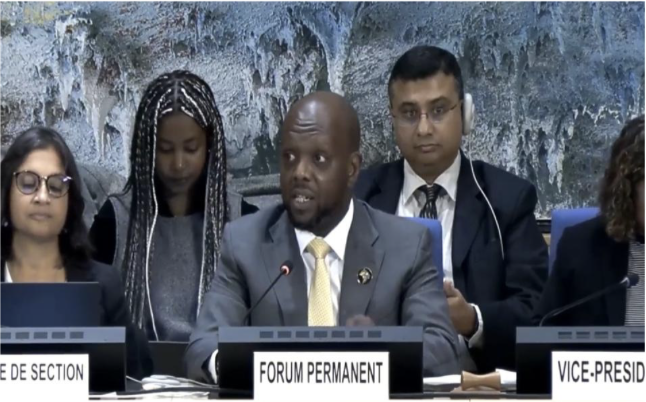
Mr Martin Kimani, Chair of the Permanent Forum on People of African Descent, began his address with a powerful reflection on the persistent nature of racial hierarchies in the 21st century. He emphasised that the "colour line" continues to uphold segregation, exclusion, and exploitation in societies around the world. Despite advancements in international law, he cautioned that systemic racism and inequality persist, affecting the daily lives of millions of people of African descent worldwide. Mr Kimani called for renewed unity among human rights and anti-racist movements to ensure the full implementation of international commitments, particularly the International Convention on the Elimination of All Forms of Racial Discrimination (ICERD).
- Renewal of the International Decade and the Draft Declaration on the Rights of People of African Descent
A significant part of the Chair's address was focused on the renewal of the International Decade for People of African Descent and the upcoming Declaration on the Rights of People of African Descent. He described the forthcoming Declaration as a catalyst for transformative change, intended to codify the rights, freedoms, and protections of people of African descent under international law.
The Forum had already conducted regional consultations in Latin America and the Caribbean and plans to hold further consultations in other regions to ensure that the Declaration genuinely reflects the aspirations, realities, and voices of people of African descent. The outcomes of these consultations will be periodically presented to the Intergovernmental Working Group on the Implementation of the DDPA.
Mr Kimani emphasised that the second Decade must deliver a more ambitious, action-oriented Programme of Action that addresses both the long-standing and emerging challenges faced by African and Afro-descendant communities.
- Three Foundational Pillars for the Second International Decade
Based on consultations with States, civil society, and communities, Mr Kimani outlined three interdependent pillars for the renewed Decade:
- Recognition: Increased acknowledgement of systemic and structural racism and discrimination, both within and among countries.
- Justice: The pursuit of reparatory justice, including recognition of historical and contemporary harms.
- Development: Greater inclusion of people of African descent in global and national development frameworks, notably the 2030 Agenda for Sustainable Development and the post-2030 development agenda.
He added that the Second Decade must also address emerging human rights issues that were not adequately covered during the first Decade, such as environmental and climate justice, digital justice and the fair use of artificial intelligence, and the protection of those facing intersecting forms of discrimination.
- Environmental and Climate Justice
Mr Kimani elaborated on the Forum's increasing engagement with environmental and climate justice, a significant concern for communities of African descent who are disproportionately affected by environmental degradation and climate-induced displacement.
He highlighted the Forum's participation in the 16th Conference of the Parties to the Convention on Biological Diversity (CBD COP16), held in Colombia in October 2024. For the first time, the collective advocacy of organisations representing people of African descent resulted in explicit recognition within the Convention's framework of their role in biodiversity conservation and sustainable use.
Mr Kimani also noted that the Forum anticipates active participation in COP30, scheduled to be held in Brazil, to promote further the inclusion and recognition of Afro-descendant perspectives in climate governance and environmental policymaking.
- Digital Justice and Artificial Intelligence (AI)
Addressing the issue of digital justice, Mr Kimani referenced the Forum's annual session held in New York in April 2025 under the theme "Africa, Africans and People of African Descent in the Digital Age."
Mr Kimani cautioned that systemic inequities and historical injustices risk being replicated or amplified through emerging technologies, particularly AI and digital systems. He expressed deep concern about racial biases in AI algorithms, especially when applied in law enforcement, surveillance, and criminal justice contexts.
Citing UN General Assembly resolution 78/265, which stresses the need for AI systems to be "safe, secure, and trustworthy," Mr Kimani urged States to adopt the following measures:
- Establish regulatory frameworks for AI grounded in international human rights law and informed by an understanding of systemic racism.
- End the use of AI technologies in policing and criminal justice where racial or gender bias is documented.
- Avoid entrenching digital divides and ensure that AI advances serve to promote equality and opportunities for people of African descent.
He emphasises that technological regulation should prioritise human rights and equity over profit or dominance of a few global actors.
- Intersecting Forms of Discrimination: Focus on Women and Girls of African Descent
Mr Kimani emphasised the importance of intersectionality, particularly regarding the experiences of women and girls of African descent. He traced contemporary discrimination back to the dehumanisation of African women during enslavement, which continues to shape social and institutional inequalities today.
Mr Kimani urged Member States to:
- Collect disaggregated data to better assess the conditions of women and girls of African descent.
- Adopt and implement comprehensive, human-rights-based policies to prevent and respond to gendered racism and violence.
- Prioritise the leadership and visibility of Afro-descendant women in policymaking.
Mr Kimani welcomed the UN proclamation of 25 July as the International Day of Women and Girls of African Descent, urging States to use this day to establish national action plans that promote equality, leadership, and recognition for Afro-descendant women.
- Reparatory Justice Framework
Mr Kimani reiterated that reparatory justice is central to the Permanent Forum for People of African Descent's mission. Drawing from General Assembly resolution 60/147, which addresses the right to a remedy and reparation, he outlined the five recognised forms of reparation:
- Restitution: Restoration of liberty, property, identity, and residence.
- Compensation: Addressing measurable harm, including physical, psychological, or material damage.
- Rehabilitation: Access to medical, psychological, and social services.
- Satisfaction: Truth-telling, acknowledgement, apologies, memorials, and sanctions.
- Guarantees of Non-Repetition: Institutional reforms, strengthened oversight, and anti-discrimination education.
He stressed that reparations must be comprehensive, gender-sensitive, and rooted in the lived experiences of affected communities. He emphasised that reparatory justice should also address contemporary inequalities, including environmental degradation and technological exclusion.
Mr Kimani commended the African Union (AU) and the Caribbean Community (CARICOM) for their leadership in advocating for reparatory justice. He welcomed the AU's decision to designate 2025 as the "Year of Justice for Africans and People of African Descent through Reparations."
- The Case of Haiti
Mr Kimani emphasised that Haiti's ongoing crisis is a direct result of historical injustices, including enslavement, colonisation, and economic coercion. He stated that the Permanent Forum had released a position paper urging that Haiti's current challenges be addressed through the lens of reparatory justice. This includes formally acknowledging the independence debt as a significant historical wrong.
He encouraged the Human Rights Council to consider the Haitian crisis within this broader historical and structural context. The Forum's paper, available on its website, provides detailed recommendations for a rights-based and reparatory approach to Haiti's reconstruction.
- Towards a Global Framework for Reparatory Justice
To enhance international coordination, Mr Kimani proposed the following initiatives:
- The establishment of an international legal advisory group on reparations to clarify responsibilities and guide implementation.
- The convening of a high-level political forum on reparations as a step toward consensus and accountability.
- The organisation of an international conference to evaluate contributions of ICERD and the DDPA, as well as to explore how the forthcoming UN Declaration on the Rights of People of African Descent can reinforce legal protections.
He emphasised that these initiatives would help establish a coherent, rights-based global framework to address systemic racism and to promote reparatory justice comprehensively.
- Institutional Review and Closing Reflections
Mr Kimani concluded by informing the Council that the General Assembly will soon assess the modalities of the Permanent Forum, based on a review by the Human Rights Council. He encouraged all Member States to actively engage in this process to ensure the Forum's effectiveness and longevity.
Quoting W.E.B. Du Bois, he reminded delegates that the "problem of the colour line" persists well into the 21st century. He called for a renewed global commitment to transform recognition into justice, and justice into lasting equality and development for people of African descent.
Summary of the Interactive Dialogue
Statements from countries
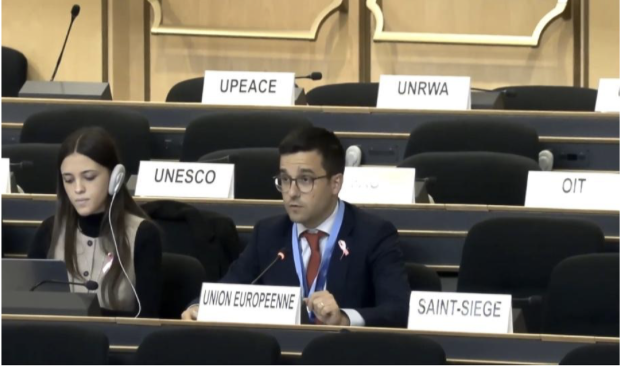
The representative of the European Union (EU) expressed their appreciation for the work of the Permanent Forum on People of African Descent, emphasising the complexity of addressing all forms of racism, racial discrimination, xenophobia, and related intolerance. He highlighted the EU's particular interest in focusing on the experiences of women and girls of African descent. He recognised that racial prejudice continues to disproportionately affect Black women and women of colour, undermining their dignity and well-being.
The representative also addressed the emerging challenges posed by new technologies, particularly AI. He acknowledged that algorithmic bias could threaten the right to non-discrimination. He stressed that the EU's regulatory framework for AI explicitly prohibits the use of predictive policing based on profiling.
Finally, she reaffirmed the EU's commitment to addressing the legacies of historical injustices, including conquest, slavery, and the transatlantic slave trade. She stressed that progress in this area should be guided by a broad consensus, highlighting the EU's preference for cooperative, inclusive approaches to reparatory justice and reconciliation.
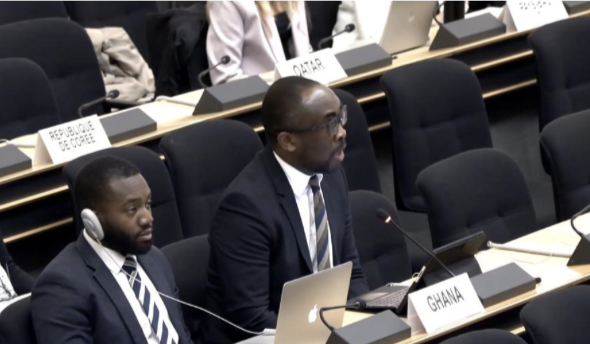
The representative of Ghana, speaking on behalf of a group of African states, emphasised the importance of solidarity with people of African descent worldwide and the historical and moral responsibility to pursue reparatory justice. He stated that reparatory justice must be multidimensional, encompassing restitution, compensation, climate action, and the restoration of dignity, and grounded in legal recognition and accountability.
Furthermore, he stressed the importance of meaningful participation from youth, women, civil society, and affected communities, asserting that past injustices are linked to ongoing discrimination.
The representative framed the pursuit of justice as both urgent and transformative, stating that political action, unity, and courageous leadership are necessary to bend the "arc of history" toward genuine justice. He reiterated the Group's commitment to advancing the DDPA, advocating for tangible progress rather than mere rhetoric, and positioning reparatory justice as a defining objective for both current and future generations.
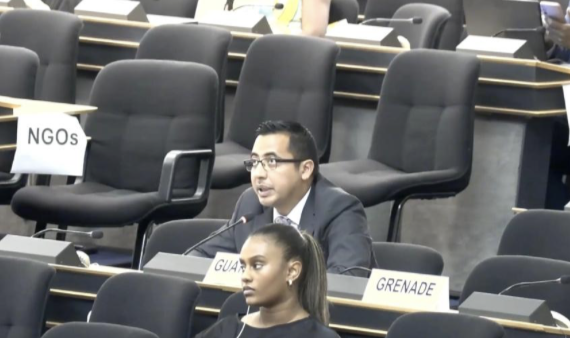
The representatives of Guatemala emphasised the structural and intersecting inequalities that continue to affect people of African descent, particularly women and girls. The representative highlighted that despite technological advancements and modern legal frameworks, Afro-descendant communities remain systemically marginalised and often overlooked, with their rights inadequately recognised. He highlighted ongoing disparities in education, healthcare, economic opportunities, and maternal health, demonstrating how historical injustices continue to shape contemporary outcomes.
The representative stressed the importance of inclusive governance in emerging technologies, particularly AI. He supported the report's assertion that AI frameworks must prioritise the voices, safety, and leadership of people of African descent to ensure social justice, empowerment, and equitable participation in the digital era.
While expressing concern over the potential for technological systems to replicate or exacerbate existing racial inequalities, he concluded with a query regarding governmental measures to prevent AI abuses, particularly in the context of algorithmic discrimination.
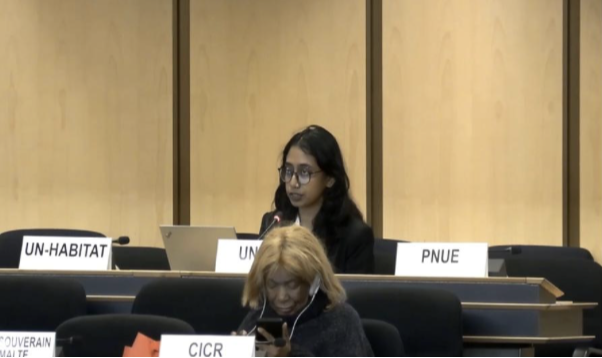
The representative of UNFPA emphasised their focus on the recognition, rights, justice, and development of people of African descent, with particular attention to women and girls. The representative underscored the lasting impact of historical oppression, including slavery, colonialism, and systemic racism, which is evident in the disproportionately high maternal mortality rates, specifically, these rates are five times higher than those of other groups.
She stressed that effective policy responses must address the intersectional discrimination faced by Afro-descendant women and girls. This requires deliberate investments in quality education, comprehensive sexuality education, and access to sexual and reproductive health services. She highlighted the need for disaggregated data and robust public information systems to ensure that the lived experiences of Afro-descendant women and girls are reflected in policymaking.
Additionally, she pointed out the transformative potential of young Afro-descendant women and girls, noting that enabling them to avoid early marriages and prevent unwanted pregnancies empowers them to contribute meaningfully to their communities. The representative concluded by reaffirming UNFPA's commitment to working with the Forum to advance the rights, dignity, and potential of women, girls, and young people of African descent.
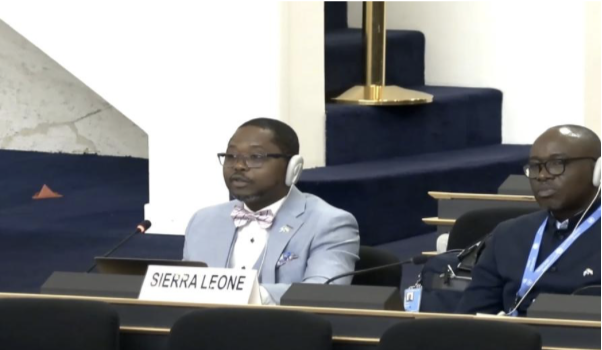
The representative of Sierra Leone highlighted the Forum's efforts to promote economic, social, digital, and equality justice, and expressed support for measures to enhance its capacity to fulfil its mandate effectively. He emphasised the importance of disaggregated data in identifying and addressing systemic and structural discrimination, aligning with the Forum's evidence-based approach.
He also advocated for an inclusive, human rights-based approach to AI governance, promoting frameworks that reduce racial bias, amplify the voices of people of African descent, and invest in digital infrastructure, STEM education, and local capacity-building to bridge the digital divide.
Additionally, the representative endorsed the Forum's recommendations for more inclusive practices, such as hosting sessions in Africa and expanding participation opportunities. He called for clear mandates and terms of reference to ensure the Forum's work is implemented efficiently and effectively, reinforcing accountability and operational transparency.
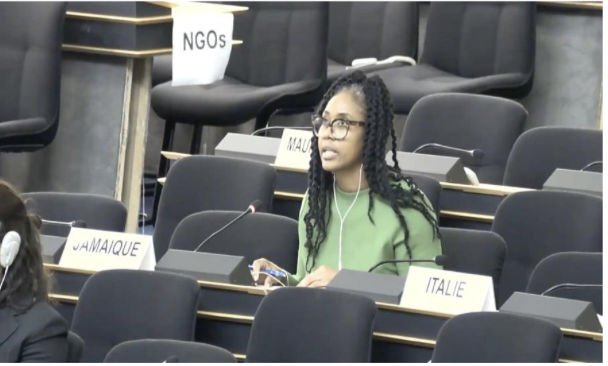
The representative of Jamaica expressed support for the recommendation to convene a high-level political forum on reparations, as outlined in paragraph 55(b) of the report. She described this initiative as a timely and necessary step to build global momentum and secure the political will required for meaningful reparatory action.
The representative also emphasised the Forum's dedicated focus on Haiti, endorsing the call for a Reparation Fund and a victim-centred process of truth, justice, and reconciliation. These measures were identified as essential to addressing the lasting legacies of colonialism and the independence debt, highlighting the connection between historical injustices and contemporary inequalities.
Furthermore, she supported the Forum's affirmation in paragraph 78 regarding digital justice, stressing that bridging the digital divide is critical to ensuring equity, dignity, and full participation for people of African descent. She reaffirmed Jamaica's commitment to collaborate with regional and international partners to advance these priorities and achieve tangible outcomes under the Second International Decade for People of African Descent.
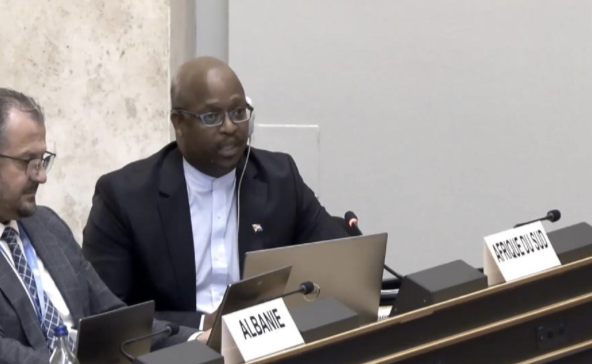
The representatives of South Africa reaffirmed that the DDPA is an essential United Nations framework for addressing the legacies of colonialism, apartheid, transatlantic slavery, and racial discrimination. He recognised the Forum's focus on the intersections of reparatory justice, digital justice, and inclusive development. He emphasised the importance of translating these discussions into concrete, measurable actions. The representative urged that reparatory justice should become a daily reality through equal protection under the law and the creation of inclusive societies where people of African descent can live with dignity, security, and opportunity.
The representative called on the Forum of People of African Descent to collaborate closely with regional organisations, particularly the African Union (AU), to establish transparent, accountable, and time-bound steps for monitoring progress. He encouraged the Forum to propose operational pathways for implementing the recommendations on reparatory justice, including measurable milestones and mechanisms to ensure accountability and protection, especially in the context of digital governance and rights.
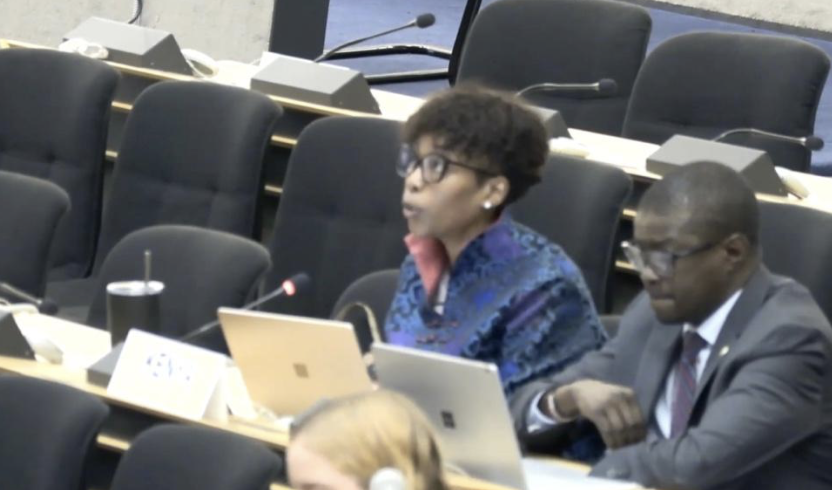
The representative of Kenya emphasised that reparatory justice must be comprehensive and multidimensional. It should go beyond financial compensation to include measures such as restitution, the legal recognition of slavery and the transatlantic slave trade as crimes against humanity, and the return of stolen cultural property.
Additionally, she highlighted the importance of cancelling illegitimate debt accumulated through exploitative economic structures. She called for climate reparations to address the disproportionate environmental and financial burdens borne by African and Afro-descendant communities.
She reaffirmed Kenya’s support for the African Union–CARICOM Joint Position on Reparations, which calls for a global reparations framework anchored in binding international law. She emphasised that this position of collective diplomacy between Africa and the Caribbean ensures a unified global response to racial injustice. She asserted that reparations are not acts of goodwill or charity but a legal and moral imperative to restore justice, equality, and dignity to people of African descent.
In discussing the transformative power of reparations, the representative highlighted their role in dismantling entrenched social, economic, and political exclusion. Key focus areas included land rights, education, climate resilience, and the pursuit of equitable global economic reform. These areas, she explained, are fundamental to achieving racial equality and sustainable development. In this context, reparations must empower affected communities and address both material deprivation and the denial of human dignity.
The representative also stressed the importance of digital equity and technological justice in the modern reparatory justice agenda. She called for equal access to digital technologies, the protection of individuals from racial bias in artificial intelligence (AI), and meaningful participation of people of African descent in the development and governance of technology.
She warned that without deliberate inclusion, systemic inequities could be replicated and exacerbated through emerging technologies, further marginalising Afro-descendant populations.
She urged the international community to support the expansion of these mechanisms globally.
Statements of National Human Rights Institutions and Non-Government Organisations (NGOs)
The representatives collectively emphasised the urgent need for reparatory justice and systemic reform to address the enduring legacies of slavery, the transatlantic slave trade, colonialism, and structural racism. They highlighted that people of African descent continue to face invisibility, discrimination, and exclusion in many societies, including Europe and the Americas, which negatively impacts their access to justice, education, political participation, and economic opportunities.
A key theme across all statements was the importance of translating commitments into concrete actions. This includes ensuring full participation of people of African descent in public life, equitable access to resources, and recognition of their cultural, social, and political contributions. The representatives stressed that the Second International Decade for People of African Descent must move beyond rhetoric to foster real inclusion, accountability, and tangible measures for reparatory justice.
Several representatives emphasised the need for coordinated, system-wide action within the UN, including linking the Forum's work with economic, financial, and development policies. They called for national action plans and the establishment of advisory or legal groups on reparations, with precise mechanisms to implement the DDPA.
The representatives also highlighted emerging challenges, particularly the impact of AI and digital technologies. They noted that these tools could either empower or further marginalise people of African descent if not governed carefully. They recommended ethical digital governance, anti-bias measures, and inclusive access to technology as essential steps toward digital and social equity.
The representatives emphasised the moral and practical imperative of equality. They framed reparatory justice not only as a moral obligation to rectify historical wrongs but also as essential for sustainable development, social cohesion, and global peace. The representatives highlighted that recognising history, providing restitution, and actively empowering individuals are crucial for creating a just and inclusive future for people of African descent.
Closing Remarks by the Chair of the Permanent Forum on People of African Descent

Mr Kimani responded to questions about AI by citing UN Resolution 79/325, which concerns the Independent International Scientific Panel on AI and the Global Dialogue on AI Governance. He explained that this resolution outlines concrete measures for Member States to address racism in AI. These measures include nominating experts on bias, discrimination, and equity to the panel; submitting evidence of harm caused by AI systems to citizens and people of African descent; and advocating for thematic briefs and dialogue sessions on racism in AI.
He noted that earlier AI-related resolutions by the United States and China stress the role of AI in sustainable development and can be leveraged to benefit people of African descent.
Mr Kimani emphasised that intergovernmental discussions should be utilised to advocate for protective measures and shared standards, ensuring equitable participation, especially for developing countries and marginalised communities. He also highlighted the importance of aligning the outcomes of these dialogues with UN human rights processes and national legislation. Additionally, he stressed the need for strong coordination between delegations in New York and Geneva.
Position of Geneva International Centre for Justice (GICJ)
Geneva International Centre for Justice (GICJ) welcomes the report of the Permanent Forum on People of African Descent. We note the comprehensive focus on reparatory justice, systemic racism, and the rights, development, and inclusion of people of African descent globally. The report provides a clear framework for addressing the lasting legacies of slavery, colonialism, and the transatlantic slave trade, emphasising that reparatory justice is a multidimensional process. This process includes legal, economic, social, cultural, and symbolic measures.
GICJ acknowledges the Forum's emphasis on inclusive gender-sensitive approaches and the active participation of affected communities, particularly women and youth. These measures are essential to ensuring that reparatory processes are equitable and reflect the lived experiences of those most impacted by historical and structural injustices. The report also highlighted specific challenges, including the situation in Haiti and systemic disparities in education, healthcare, economic opportunity, and political participation for African-descended communities.
The report reaffirmed the centrality of the DDPA and the International Convention on the Elimination of All Forms of Racial Discrimination as crucial frameworks for addressing structural racism and ensuring accountability. GICJ emphasises the need to fully implement the DDPA and integrate its principles into national and international policies during the Second International Decade for People of African Descent.
GICJ commends the report's focus on digital justice and the ethical governance of emerging technologies, particularly the need to prevent racial bias in AI and ensure equitable access to technology. Regional consultations in Colombia and Brazil were recognised as effective mechanisms for engaging communities, informing policy, and advancing the development of the UN Declaration on the Rights of People of African Descent.
GICJ urges States to adopt the report's recommendations, which include fully implementing relevant laws and international obligations; empowering local governance; collecting disaggregated data; addressing gaps in education, employment, and justice; and ensuring that reparatory measures are action-oriented, transparent, and accountable. We further stress that reparatory justice must be understood both as a historical redress and a forward-looking strategy to dismantle systemic inequalities and structural racism.
Finally, GICJ calls on States, international organisations, and civil society to take immediate and sustained action to operationalise the principles outlined in the report, ensuring that the recognition, justice, and development for people of African descent are effectively realised during the Second International Decade.




